Algebra LAB: Cookie Monsters Team Wins Money Motion Student Fintech Hackathon
March the 18th, 2023 - The Algebra LAB gathered together some of the most well renowned representatives of the entrepreneurial and scientific community in the jury that evaluates the best student digital projects in the financial and insurance industries.
A sustainable fourth pension pillar through the use of the first Croatian green currency, payment by fingerprint, Tinder for investors, a biometric bracelet as insurance against deepfake – and other disruptive ideas could be heard by visitors of the Money Motion Student Hackathon, a unique event held at the Spark Event Spaces premises , at the Algebra campus in Zagreb, organized by the Algebra LAB.
The student hacking competition was held as part of Money Motion, the largest fintech conference in Croatia, which gathered as many as 700 participants. The decision on the best project was made by an expert jury consisting of entrepreneurs, members of the scientific community and professionals from the financial and insurance industries, whose members are: Hrvoje Josip Balen, member of the Algebra Board; Gordan Kožulj, director of the business consulting department, Deloitte Croatia; Ivana Vukov, special adviser to the Prime Minister of the Republic of Croatia; Zvonimir Oreč, CFO and member of the Management Board, Amodo; Robert Penezić, General Manager, Monri; Prof. Ph.D.Sc. Mislav Ante Omazić, EFZG; Renata Brkić, Managing Partner, Feelsgood Capital; Goran Kralj, member of the Management Board of PBZCroatia Osiguranje; Marijana Bačić, member of the Management Board and chief operating officer for business customers, Hrvatski Telekom; Ivan Šimić, Senior Manager, PwC SEE Consulting; Relja Marković, Managing Director, Digital Transformation, Addiko Bank and Ph.D. Mirko Talajić, Director of Analytical Systems Support Directorate and CDO, Hrvatska poštanska banka.
"With competitions like this one, we try to strengthen the relationship between education and the labor market and show our students how to develop an entrepreneurial mindset already during their studies. In today's time of rapid changes, it is young people who are the source of information and new knowledge about digital technologies, and at the same time their biggest consumers. In this way we encourage them to use this knowledge in an applicable way. It was an honor to be part of the jury and participate in deciding on all the inspiring ideas that we had the opportunity to hear today, and I am sure that many of them will very quickly develop into successful entrepreneurial stories," – said Hrvoje Josip Balen, a member of the Algebra Management Board.
The teams were mentored by Algebra's experts: "I am extremely pleased to see the enthusiasm of the students who approached the demanding challenges in front of them with utmost courage and professionalism. We tried to support them on this path and guide them towards the development of the idea in the direction of innovation, but also market sustainability, as a component that should not be ignored in business processes. Algebra LAB was conceived precisely as a bridge between science and entrepreneurship, a collaborative ecosystem where many successful business ideas and start-ups have matured, and with competitions like today's hackathon, we maintain the dynamism of cooperation between students and entrepreneurs", said Ph.D. Maja Brkljačić, manager of Algebra LAB.
The winner was the Cookie Monsters team, whose members Martin Majerić, Dino Pećarina and Margareta Zeko designed biometric technology applicable to devices worn on the wrist such as watches or smart bracelets, which serve as an identification factor when entering mobile banking applications and other financial digital channels which require additional user authentication, and which can serve as the first line of defense against deepfake technology.
The members of the winning team won a prize of 3,000 euros: "We decided to join the competition because it seemed like a great opportunity to learn something new and develop a good idea that might be implemented one day. We decided to take on this particular challenge because it is the area where we can bring the most innovation to the table, and we think we made the right choice. People are still not aware of the extent of the deepfake problem, every year the demand and consumption of deepfakes in the world grows by 400%, and this technology is growing especially fast in the financial industry" – emphasized Cookie Monsters team member Margareta Zeko.
The winners of today's competition can be considered all those who entered, because almost all teams achieved a certain number of points, which means that the experts liked them very much, concluded Ph.D. Mislav Ante Omazić from EFZG, who as the initiator of the hackathon and reflected on the importance of student competitions in innovation: "Communication between different professions is extremely important, and another thing is teamwork. The problems of the modern world are extremely complex and cannot be solved by the individual, especially from the perspective of competences. So it's good when they are different. Many young people will already work in teams at the beginning of their careers, however, group and team are not synonymous and it is necessary to learn a lot and work on developing collaborative skills. This type of competition pushes people out of their comfort zone, in which learning and progress is limited, from which it is important to get out and go through the zone of fear, and events like our competition make this possible."
"There is nothing more useful than encouraging young people to think in the context of entrepreneurial ideas, perhaps they are not exposed to this in schools and that is why universities that encourage this, like Algebra, are actually the right way to direct them to their further professional development. I personally got involved as a member of the jury in this project because I want to be part of successful entrepreneurial stories in Croatia, and Algebra certainly is," – said Gordan Kožulj, director of the business consulting department at Deloitte.
"Today we heard a lot of interesting ideas, and as a member of the jury, I tried to see that the idea was not only relevant, but also ambitious, because you should always reward looking outside the usual angle of things. The students are great and I believe they will achieve success in the labor market as well. Young people should be told that they should always believe in themselves and should not be afraid of innovation, everything can be improved, and success is guaranteed for those who are persistent" – said Ivana Vukov, special adviser to the Prime Minister of the Republic of Croatia.
"The students showed enviable knowledge, they showed good preparation, the amount of topics and innovations was great and I want to congratulate everyone once again for their courage in participating. Amodo as a company is present in the field of fintech and it is an integral part of our DNA" – said Zvonimir Oreč, CFO and member of the Management Board, Amodo.
"It was an honor to participate in this kind of competition, I'm glad to see young people with creative ideas, and I hope that we will organize more similar events in the future" – concluded Robert Perezić, General Manager, Monri.
The competition was intended for all students interested in learning how digital technologies are revolutionizing the financial industry and who are ready to demonstrate their knowledge in the field of application of new information technologies, fintech, artificial intelligence, IoT, blockchain and other innovations in existing financial systems.
For more, check out our news section.
Despite the crisis, Croatian start-ups are recording constant growth with the support of investors and Algebra's incubator
March the 18th, 2023 - Algebra LAB, one of the oldest startup incubators in Croatia, provides young innovators with a symbiotic ecosystem in which business ideas are continuously maturing for the 11th year in a row.
Despite investors' caution towards risky investments, as much as 958.3 million dollars were invested in domestic start-ups in the first three quarters of last year alone – it was concluded at the Algebra startup meetup, which was held at Algebra's Zagreb campus, in the Algebra Spark Event Space.
Algebra LAB, as one of the oldest startup incubators in Croatia, has had an uninterrupted series of incubator generations since 2012, thanks to the systematic support available to them in the innovation ecosystem that combines higher education with entrepreneurship:
“At Algebra LAB, we try to ensure that both sides profit symbiotically in development - our students from the fact that their incubator is located in the building where they study and listen to lectures every day, and that they can find themselves in the world of entrepreneurship in a short period of time, and our start-ups from the fact that some of their mentors and lecturers work in the higher education system, which means that they are constantly at the source of new knowledge and information. In such a collaborative system that combines cutting-edge innovation and science with entrepreneurship, we see the key to getting out of every crisis, of which there has been no shortage in the last ten years. Algebra LAB has spawned many successful entrepreneurial stories today – Farseer, Velebit AI, Sport React. We invite all those who are thinking about starting their own business and need support on the way to the realization of an innovative idea to join the new incubator generation for which the enrollment cycle starts at the end of the year," said Maja Brkljačić, head of Algebra LAB.
Startup Report magazine was also presented at the event. "The appearance of unicorns, Infobip and Rimac, as well as big exits such as Nanobit and Gamepires, and now Photomath, encourage the growth of investors' interest in Croatian startups, so last year a record number of startups received investments. However, due to the war in Ukraine and the hectic exit from the pandemic, investments are less than before, although the situation in Croatia is still very good. It was the second best year so far," said Bernard Ivezić, editor of the magazine.
Four new venture capital funds are coming to the Croatian market. In the next five years, the amount of money that will be available for start-ups will be 10 times higher than it was in the past period – about 300 million euros. A lot of money also means big problems for funds that have to start competing for start-ups, which makes the entire ecosystem quite dynamic and competitive, especially in an environment of crisis and economic uncertainty.
The impact of the economic crisis and the crisis caused by Russia's aggression against Ukraine on the investment climate is not negligible, which was discussed at the panel discussion, along with Maja Brkljačić, by Matija Nakić, the founder of the Croatian fintech Farseer, which flourished in Algebra LAB, Miryana Joksović, co-founder of Arcion Labs and member of the ACAP Board, and veteran of the Croatian startup investment community Vedran Blagus, principal of the oldest Croatian VC fund, South Central Ventures. Representatives of the start-up scene had the opportunity to hear first-hand useful tips for surviving a turbulent social and economic environment, as well as the importance of leadership from experienced start-up founders:
„In a crisis, it is important to always lead by example, and this is what the leaders of every start-up should focus on. Investors expect this period to last 24 to 36 months. It is the most difficult for seed stage startups that are not in the portfolio, because for them the risks are the greatest, as well as the dependence on investors. This is precisely why good networking with potential investors is most important – my advice is not only to look at them, but also at their portfolio companies and the companies they are connected to, because building that network of acquaintances is the key to future success," said Miryana Joksović from Arcion Labs and referred to the recent layoffs in the tech community: "Most of those who were previously employed in large companies can hardly adapt to the start-up culture, so the question is how to connect these talents to the start-up ecosystem because they are used to different work standards atypical for the dynamics of small entrepreneurs who are just starting to build their companies.
The fact that every crisis, including this one, can be an opportunity was seen by Matija Nakić, the founder of Farseer, on her own example: "Our process of getting the investment was not dramatic and we managed quickly. Investments have slowed down if we look at the environment, while in the last two years there has been a lot of capital and there has been a significant jump in employment and funding in IT companies. I love crises and I think they are a good opportunity to rethink yourself and your business model. People who left large IT companies like Google will surely find a job quickly because they have excellent knowledge and will return to the ecosystem and bring this new knowledge to young companies. I believe that we have an interesting couple of years ahead of us, especially with the growing influence of AI."
"In 2021 and 2022, capital was cheap not only for start-ups but also for funds. In the last quarter of 2022, there was a significant drop in investment. There is money, the investments have been shaken, but they have not stopped" – emphasized Vedran Blagus from South Central Ventures.
Despite the data on the reduced investment wave as a result of global economic events, the panelists agreed that the challenging period facing the domestic and global start-up scene is only a prelude to the continuation of the prosperous period. Namely, start-ups now face new challenges in the form of investments in research and development, as the basis of new innovations that can help overcome the crisis:
"As far as the activities and interests of start-ups are concerned – there has been no reduction, in fact there are more of them than ever before. There is a large number of applicants and those interested in our Lab, and the so-called scene or material fatigue does not exist, according to what we see – and that is the reaction to the events and the applications themselves, you can see the liveliness of the scene. In Croatia, there are more and more investment funds that heal the wound of the lack of early capital, such as Fil Rouge Capital and South Central Ventures, which enable start-ups not to think about money, but about their product or service they are developing. I see no reason for concern for the Croatian start-up scene, except for the caution required when hiring new people – especially when changing culture and moving to scale-up" – said Maja Brkljačić, head of Algebra LAB, adding that the number of 500-600 of startups from the beginning of last year, according to some estimates, rose to as many as 900 as estimated at the end of 2022, thus signaling that the start-up scene is growing despite unfavorable circumstances.
At the event, two start-ups from Algebra's LAB (EcoWashers and TablePop) presented their innovative ideas to the public through five-minute pitches. EcoWashers allows the user to order a vehicle wash on a smartphone in a few steps, and through the dry ecological washing system, it uses a unique nano-technology that is safe for the environment and a minimum amount of water. TablePop is a platform that allows guests to order and pay contactless in restaurants by simply scanning a QR code. In addition to them, the start-up IoTaaP presented its innovations and experienced member of the start-up and technology community Ivo Spigel presented his new fintech project Pontyx to the attendees.
Algebra Spark Event Space and Algebra Spark Coworking, an innovative and unique space in the western part of the city, was introduced to the audience by Hrvoje Josip Balen, a member of the Board: "Unlike other similar co-working spaces, Algebra's rooms are specially designed and focused on business development and the creation of an entrepreneurial microclimate suitable for serious companies that focus on business growth. Algebra's innovative space enables companies to organize larger or smaller business events, lectures, workshops, as well as a number of other private or commercial events with all the necessary infrastructure. Interested companies and individuals can also rent additional space of over 12,000 m2 within Algebra Rent Space, which includes top equipment and technology with the aim of achieving the maximum level of functionality - through the synergy of office spaces with Algebra LAB, as a scientific research center intended for small and start-up companies."
Algebra's Spark Coworking Space is also used by Matija Matija, a young start-up who designed the Lanke website, which shows all available new real estate projects in one place. Matija reflected on his stay in Algebra's offices: "I was most impressed by the location, which suits me because I myself am in the western part of the city, and on the other hand, the quality and equipment of the office, which contains everything I need in one place. Last, but not least – I appreciate the peace that the office space offers, which I need to focus on work, which I'm not sure I would find in other similar coworking spaces in Zagreb."
Due to their focus on innovation in business, start-ups are one of the segments of the economy that will significantly influence the future development of the entire society, and their role is not only in their own progress, but also have the potential to significantly accelerate the growth of other economic branches. Today, start-ups are not limited only to the IT sector, but also appear in agriculture, hospitality industry, and banking, where they help accelerate the growth of entire ecosystems, and their incidence in Croatia is growing year by year, which, in addition to private investors, is mostly contributed by incubators such as Algebra LAB -a, who provide them with support in the early stages and beginnings of business ideas.
For more, check out our news section.
Algebra Students Use Technology to Map Wineries and Promote Art
October 24, 2022 - HAVE you ever talked to an incredibly smart young person and wondered "Where was I at that age"? Algebra students will make you ask that question.
We present you the fifteen Algebra students, who decided to change their surroundings for the better with the help of advanced technology while working on their degrees. These are the future Algebra graduates who, as part of the Innovative Project course, come up with ideas and products that aim to change the world today and tomorrow!
One of the teams we present to you today considered how to make it easier and simpler for all wine lovers to find wines and wineries in Croatia. They came up with a digital wine atlas called Wineata, which makes it easier for wine lovers to access information about quality wines, wineries and wine tours available throughout Croatia. The project is closely monitored by mentors - Stella Antolović and Silvio Papić, and the team is formed by nine students from different areas of Algebra graduate studies - Karlo Jakobović, Marko Sabolić, Jurica Slovinac, Luka Žgrablić, Suraj C. R. C. Reddy, Elma Melkić, Jigisha H. Shah, Yacine Akki and Celina Wedershoven.
1. You came up with an application that is a wine atlas of sorts - where did you get the idea?
At the beginning of this story, we talked a lot about possible ideas and projects that could be realized, but together we agreed on the fact that wine lovers on the market cannot find interesting wineries or information about different varieties of wine so easily. At the introductory lectures of the Innovative project course, we had the opportunity to further develop our idea - where we agreed together that this is the right project for us and what the market and consumers need.
2. What challenges did you face during the development of Wineata?
It is challenging to predict what will happen in the market after the COVID-19 pandemic. We are aware that the research of the wine world depends significantly on the situation in the market, therefore the biggest challenge we have faced is the collection of all relevant data on time. However, when the team is committed and passionate, things work. Another challenge was the cooperation of different team members from different fields. Teamwork is our biggest advantage, once we managed to get along, understand and accept the common direction in which the project was to develop, we quickly came up with interesting solutions.
3. You conducted a survey that served as a starting point for creating the application - what did the results show? Does Croatia need an application that will make it easier to find quality wine destinations?
The survey results are very interesting. We created one survey for the Croatian market and one customized survey for tourists. Of the total number of respondents, 7.6% drink wine every day, 9.7% drink wine three times a week, and 22.4% drink wine once a week. We can conclude that almost half of the respondents, more precisely 39.7% of them, drink wine at least once a week. When asked where they most often buy wine, 52.7% answered that they buy in large stores (supermarkets), 15.6% answered in wineries, and 11.4% in wine shops. This is good news for our application. This means that respondents visit wineries and wine shops, and we can provide them with a better experience of visiting these places. The aim of this research is to understand their habits and how we can improve their wine experiences through our application. Of the total number of respondents, 69.2% said they would like to visit wineries in Croatia, and 21.1% of respondents were not sure. Of the total number of respondents, 17.3% would use an application that would help them find wineries and their offers in Croatia, 35.4% agree, and 22.8% are unsure. From this question, we can recognize that there is potential for our application and that users are willing to use this type of application.
4. Wineata was designed by an interdisciplinary Algebra team - how did this collaboration work?
We believe that no business works as well as it could with just one specialized function or with the same way of thinking. This was a unique opportunity to experience in practice what it's like to work in an interdisciplinary team because we are sure that in the future such an opportunity will be presented to us in the business world, and this interesting project prepared us for that situation.
5. Do you think the market will recognize the value of Wineata and how do you plan to approach your target audience?
We believe that the market will recognize the benefits offered by Wineata, mostly because it will be created with the purpose of helping consumers navigate the world of wine. Wineata will combine offline and online experiences and provide relevant and up-to-date information to consumers. It will combine different moments of consumption, such as daytime or evening gatherings with wine or a combination of food and wine. Wineata is there for the consumer, ready to provide them with personalized advice.
6. Do you have plans for an expansion beyond the borders of Croatia?
Of course, we plan to expand beyond the borders of Croatia in the future. We believe that this project has great potential for acceptance in other markets as well. According to Statista, the consumption of wine in the world in 2021 is estimated at 236 million hectoliters, which is a decrease compared to 241 million hectoliters in 2019. We believe that the market will recover during 2023 and that we will attract the attention of consumers on the global market with our interactive wine list of the world. Consumers will be able to explore interesting locations and events near them, read reviews and learn about wines. Our platform will be completely personalized for the user who uses it, which we believe consumers will recognize as a benefit and use it every day.
The second team of the Algebra graduates that we are introducing is the interdisciplinary team of Krivovizija (crooked vision), which works on an artistic platform and functions on the basis of blockchain technology. If you are wondering what blockchain is and how it can be used to develop art - read on! These ingenious young people have made it possible for artists to upload their artwork and create their digital portfolios on their platform. However, the platform is not intended only for artists, but also for buyers of art and the interested public. The team consists of six Algebra students: Tomislav Čavala, Fran Bartolić, Ena Saško, Ivan Popović, Karlo Bertina and Maxime Coutin, backed by mentors Karlo Josić and Halida Sarajlić. Ivan Popović answered on behalf of the team, who explained to us what blockchain is and how they connected blockchain and art.
1. Can you briefly explain to us how Krivovizija was created and what it brings to its potential users?
The project actually had a development path which was quite different at the beginning from the current version, i.e. the first variants of the idea were much more focused on blockchain technology, motivated by the fact that the term "NFT" has exploded in popularity in the last few years. However, as we were developing the idea, we ran into several obstacles and we came to the realization that ultimately we want to create something that will have integrated modern digital technology, but above all something that will create long-term value for users. What our idea brings to its users is simply the possibility of learning, creating "digital works", presenting them on the global market, and freely interacting with other users who share interests in the same things. In this specific case, it refers to digital arts such as pictures, photographs, comics, etc...
2. What did team collaboration look like during the creation of Krivovizija? Who came up with the name?
Like any project, we believe that there are countless good ideas, but no matter how good an idea is, in the end, everything will depend on some kind of compatibility and interaction of the team members who bring it to life. We were lucky that a group of people who have adequate knowledge and motivation to build something of this magnitude got together. As for the name, Krivovizija is primarily our team's "code" name, and the source of the name is not overly praiseworthy if we are honest. If we had known that someone would ask us this, we probably would have chosen something else. Basically, one of the team members came up with the information that there is a website that randomly generates words that are somehow inspired by terms that were used in the former Yugoslavia. There were quite a few options, but we agreed that Krivovizija was the best choice.
3. Krivovizija is built on blockchain technology. Explain to us laypeople what exactly blockchain technology is.
Here we will mention blockchain in two contexts. In its basic form, it is a technology that refers to the decentralized storage of information that is impossible to change or copy. Since that may sound a bit abstract, we will mention another context related to our project. So, simply put, we use blockchain technology primarily to protect the ownership of our users' digital assets. If, for example, someone buys a digital photo, we will ensure that the owner is the sole owner and that someone cannot show up somewhere with a copy and claim to own the original.
4. How did you decide to develop a platform that is intended specifically for artists and art lovers?
The popularity of digital art has grown exponentially over the past few years, technology has become more accessible, there are more and more talented people, and the global COVID situation has significantly accelerated the transition of a large number of our activities to digital spheres. In addition, studying the current state of the market, we realized that there is a great opportunity to build a platform of this type, and we believe that now is the ideal time for such an undertaking.
5. Where do you see your advantage over your competitors? How will you stand out in the market?
Currently, there are several somewhat similar platforms, but all of them are related to a specific domain, so none of them is adequate to be used by a wider group of users possessing different talents. Some of the platforms are focused exclusively on photography, some only on 3D animation, etc. But the most important thing to mention is that the social aspect is not in focus in any of them or it is extremely limited, and we consider that our biggest advantage. So, in addition to the aforementioned blockchain technology that we use in terms of protection, we want our users to use the platform as a social network where they can learn about the tools they are interested in, present their talents globally, communicate openly and create interest groups, and ultimately make a living from their work.
Algebra University College: Interest in Our Studies is 40% Higher than Last Year
July 12, 2022 - Of all private higher education institutions in Croatia, the largest number of high school graduates this year chose Algebra University College as their first choice when applying for study programs. Here's why.
Algebra continues to raise higher education standards, which, according to data published on the Postani student portal, resulted in an increase in applications for study programs by 40 percent compared to last year, or by 27 percent when it comes to the first three choices. According to the current number of applications, Algebra records the most significant growth in interest in design study, for which even twice as many high school graduates applied as last year. In addition, interest in the study of digital marketing increased by 40 percent, while the study of computing recorded 35 percent more applications.
This is the result of continuous investments in the topicality and quality of teaching programs and academic collaborations, such as with one of the oldest components of the University of London - Goldsmiths, which allows students to receive Croatian and British diplomas without leaving Zagreb. As many as 160 prospective students have applied for these studies, evaluated by one of the world's 500 best universities, beginning next academic year at Algebra. For 70 of them, this is their first choice of study. In addition, through cooperation with the University of London, Algebra graduates can choose between undergraduate studies in design, computing, and digital marketing this school year.
"The great interest in Algebra in collaboration with Goldsmiths University is fantastic news. In the year when we celebrate the 30th anniversary of diplomatic relations between Britain and Croatia and our 30-year partnership in all fields - from defense and security to business and culture - the cooperation between Algebra and Goldsmiths in education is further proof that we are strengthening our ties. I wish all participants the best of luck in obtaining a degree from one of the most prestigious British universities," said Simon Thomas, the British ambassador to Croatia.
"British universities are rightly recognized as the most prestigious in the world, and the fact that they make international connections is key to that success," said Nigel Bellingham, director of the British Council, not hiding his enthusiasm for such a great interest in the new partnership between Algebra and Goldsmiths.
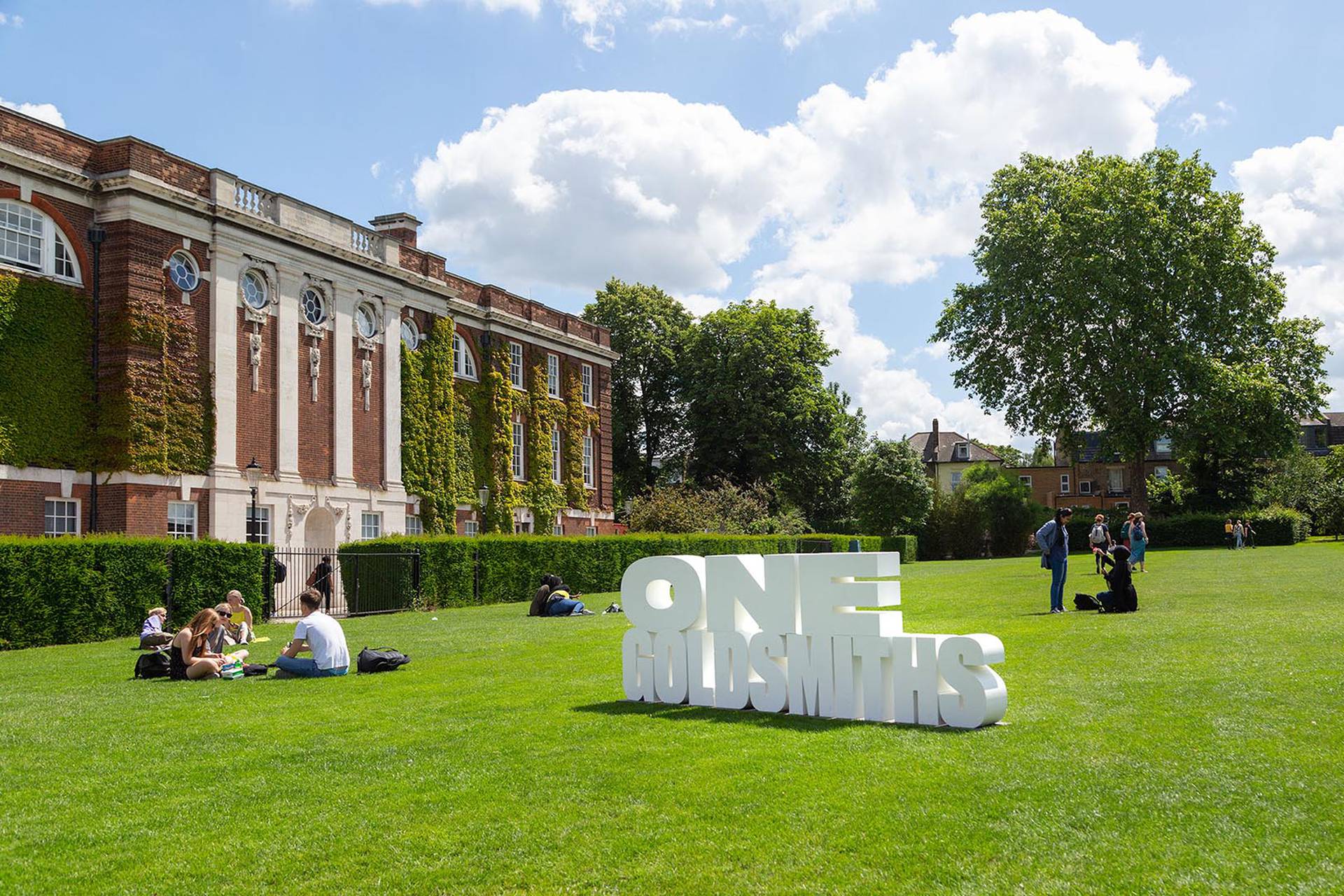
"This cooperation represents a model for other partnerships between Croatian and British universities. The British Council is proud of its partnership with Algebra, and we will continue to work with our friends in Croatia to contribute to the success of this program," concluded Bellingham.
A particular interest is visible among young people who have already completed three-year professional studies since they have the opportunity to enroll in one of the graduate studies in Algebra, and in addition to Croatian, obtain a British or French master's degree after two years of study this year. Graduate studies in data science, computer game development, computer science, and digital marketing can be completed this year with diplomas from the University of London and Algebra, and they also have the joint study "Internet of Things and Artificial Intelligence," which Algebra and French EPITECH accredited last year. This study is also conducted in English, with one year being attended in Zagreb and the second in Paris. EPITECH or L'école de l'expertise informatique et de l'innovation is one of France's largest technological educational institutions, with more than 6,000 students and multiple campuses in several European locations.
Despite the decline in the number of Croatian high school graduates, Algebra records an ever greater interest in its study programs, which is the best indicator that the innovative approach and insistence on the quality of the content and the quality of the teaching implementation make sense.
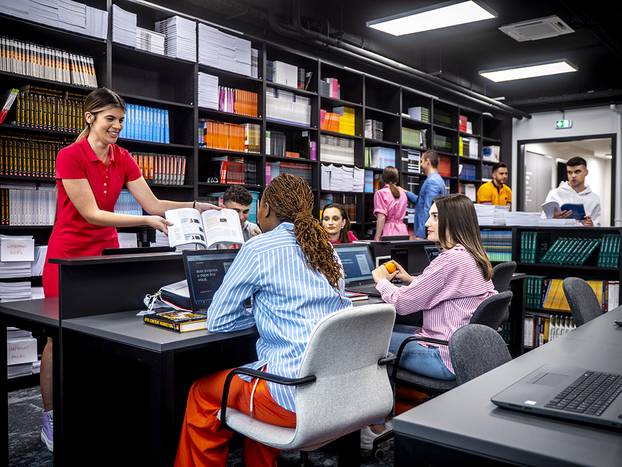
"We are very focused on the global occupations of the future, and in regular communication with leading Croatian and international employers, we adapt our programs while encouraging the arrival of foreign students. Furthermore, we place great emphasis on practical learning, which we enable students to do through cooperation with renowned domestic and foreign companies, so the knowledge acquired by our students is immediately applicable in everyday work. This is one of the key reasons global and domestic employers highly value our graduates, as evidenced by the fact that within three months of completing their studies, almost all of them are employed in the profession. This is an important motivator for the growth of applications that we are witnessing, even though the number of graduates who want to continue their education this year is ten percent lower than last year," pointed out Mislav Balković, dean of Algebra.
For the last five years, all Algebra graduate studies have been conducted exclusively in English, and from this academic year, this is also possible in almost all undergraduate studies. In addition to opening a new perspective for employment and career advancement, this approach enables an educational experience in a multicultural and multinational environment.
The experience of studying at Algebra took on a new dimension this spring with the opening of the new Zagreb campus, making Zagreb a multidisciplinary center of excellence and an incubator of globally competitive human potential, which will increasingly attract domestic and international students and participants of various educational programs in the coming years. Students have at their disposal 35 modernly equipped lecture halls and laboratories, 14 online cabinets, a video, audio, and podcast studio, a drawing room, a 3D print room, an innovation lab, a large server room, a library, and a room for project collaboration and numerous other specialized rooms.
For more, check out our lifestyle section.
Meet Foreign Students Choosing Croatian Education: Nirupam Kumar Mundra from India
May 29, 2022 - Among the growing number of foreigners relocating to Croatia, international students are increasingly visible. So who are these foreign students choosing Croatia, and why? In the fifth of a new series, we get the perspectives of life and study in Croatia through the eyes of its foreign students, continuing with Nirupam Kumar Mundra from India.
Among the many foreign tongues heard around the Croatian capital these days is the growing number of students choosing to do their graduate programmes in Croatia. A safe, affordable EU country, with a rapidly expanding programme of high-quality graduate courses in English, with excellent employment opportunities upon graduation, are just some of the reasons for choosing Croatia. And the quality of that education was highlighted recently, as Algebra University College signed an academic partnership agreement with Goldsmiths, University of London (as reported previously on TCN), thereby allowing Algebra students to study under the approved programmes of one of the 500 best universities in the world according to the World University Ranking.
Despite the growing excellence of English-language graduate and post-graduate education in Croatia, the opportunities are not so well known, and so TCN - in partnership with Algebra University College - has compiled an authoritative guide to what you need to know about studying in this beautiful country. Check out the Total Croatia Study in Croatia guide.
Nothing paints the real picture of studying in a foreign country better than the real experiences of students living the day-to-day reality. In a new series on TCN, we meet some of the international students who have fallen in love with Croatia, many of whom plan to stay and work here if they can find employment. We look at the realities of life, why they chose Croatia, and what advice they have for others contemplating studying in Croatia.
Time to meet Nirupam Kumar Mundra from India who is doing a graduate course in Applied Computer Engineering, Game Development at Algebra University College.
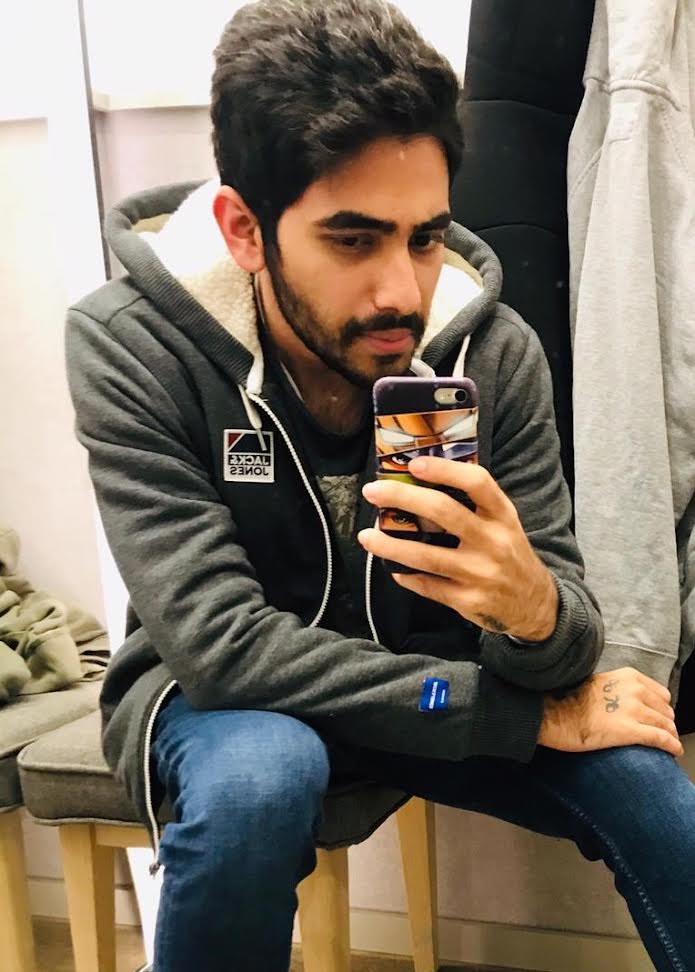
1. You chose to study in Croatia. Tell us what were the main factors in that decision.
I am from India. We don't have any university that offers game development graduate studies. I was looking for universities across Europe, and I found out that the course I am looking for is offered in Zagreb, Algebra University. The main factors I chose for education in Croatia is the curriculum is what I got attracted to most and the tuition fee, very affordable. The reason why Europe – it is rich in culture & people. I feel like I am on another planet, which I don’t want to leave.
2. How is the experience so far? Give us some pros and cons.
About the experience, I love the education system here. We have a vending machine in the university and a lounge. The technology used in the college is jaw-dropping for me.
Pros
- Beautiful city & people.
- Traveling doesn't take much time.
- Very good education system.
Cons
- Difficult to understand while purchasing grocery & food. The description is in Croatian on almost all products.
- Non-Croatian speakers will have difficulty sometimes communicating.
- Residence permit renewal every year.
3. How was your perception of studying in Croatia different from the reality? Give us some things that have surprised you about the experience?
When it comes to studies in Croatia, I can talk all day about things that surprised me. I was amazed how we can sit randomly in class with no gender rules. My university has an application where we can track our grades, attendance, and check exams & news. I love swiping my college ID card when I enter class, it’s for attendance. I know all these things are very common here but not for me. Especially I love the teaching structure. One day of lectures and another day is practice, a perfect way to learn.
4. How easy was it to do the paperwork to enroll in the study programme? Any suggestions to improve things?
Enrolling in the study program is so much easier. If there is a slight difficulty doing it, the university is always available to help us with the process. Usually, students from my place consult third party institutes to apply for universities abroad, but I did it on my own.
5. Tell us a little about the accommodation and the cost of living.
I started paying 500 Euros when I first came here, due to no exposure about the city and houses here. Later, I started learning things and got myself a new place paying only 250 Euros/ month. Some of my friends from India paid 180 euros/ month (it Includes rent & utilities).
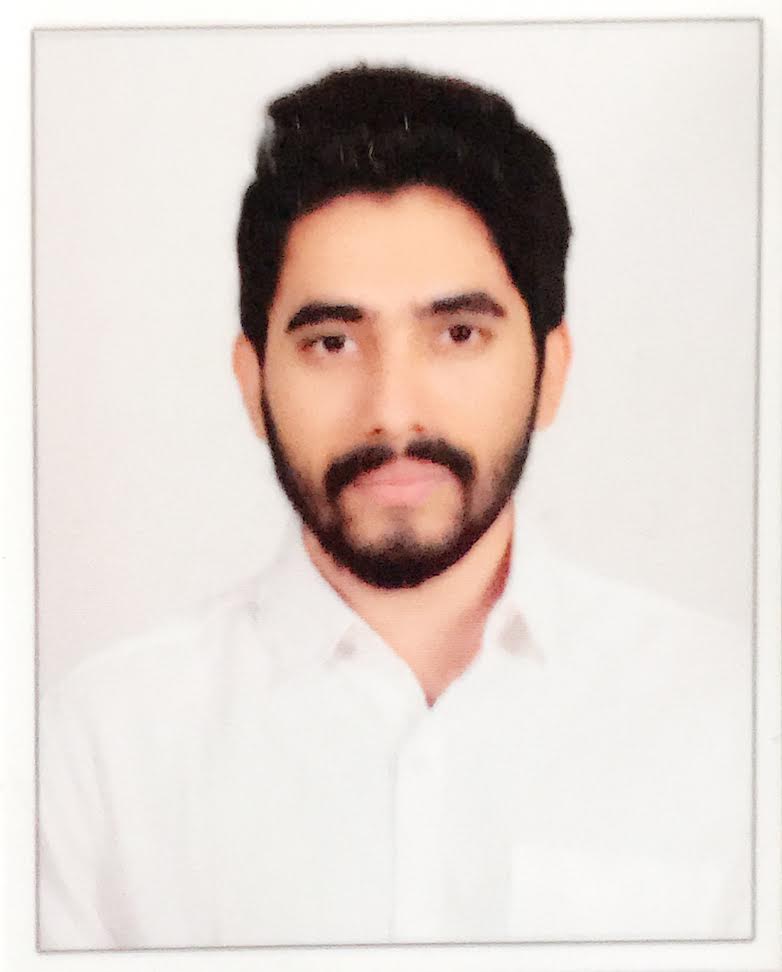
6. Finding work is a key priority for students, both to help finance the study, but also upon graduation. How hard have you found it to find work, and what are the main obstacles?
I chose a different career path for my master studies. I must start from scratch, so I’ve decided to dedicate all my time to the university, so I haven’t made an attempt to apply for a job here. I think I’m not the right person to talk about this question.
7. Tell us about the Croatian lifestyle and making friends. How has it been for you?
What I see is making friends here is easy, everyone here is polite, friendly & welcoming. In my three years in Zagreb, I never encountered any racism or toxicity from students or anyone else.
8. Do you plan to (try and) stay in Croatia when your studies finish? Why/not?
I plan to find work here. The career I choose, which is game design, has a few good opportunities in Croatia. Most importantly I love Europe.
9. Three things you have enjoyed most about your experience studying in Croatia?
Festival arrangements & outdoor parties with music and decorated with beautiful lights.
Going out on trips to the coastal side of Croatia is the best.
Parks & libraries – they look like movie locations.
10. What advice do you have for people who are considering studying in Croatia?
It’s going to be challenging in the first few months, I will tell you one thing if you get to know Croatia and its people: it is worth living here. Since Croatia is not in the Schengen area zone (but it will be soon) with a Croatian resident permit, you can only travel to Bulgaria, Romania, and Cyprus, which I consider a limited option for few non-Europeans. I highly recommend learning a few Croatian words. It would help in a situation like purchasing food, groceries, also for travel & shopping.
Are you an international student on a graduate or post-graduate course in Croatia, who would like to be featured in this series? Contact us on This email address is being protected from spambots. You need JavaScript enabled to view it. Subject Study.
To learn more about the options for studying in Croatia, check out the Total Croatia Study in Croatia guide.
For more information on courses offered by Algebra University College, visit the official website.
Algebra and Goldsmiths, University of London Sign Academic Partnership Agreement
January 26, 2022 - An Academic Partnership Agreement has been signed between Algebra and Goldsmiths, University of London to provide students with Croatian and British degrees. Algebra students will be able to study under the approved programmes of one of the 500 best universities in the world according to the World University Ranking.
After the successful evaluation of study programs and the institution itself, Algebra has become a strategic academic partner of one of the oldest colleges of the University of London. Due to inter-institutional cooperation between Algebra and Goldsmiths, University of London, starting from the academic year 2022/2023, students will be able to study in Zagreb according to UK and EU standards and thus obtain both Croatian and British degrees.
Cooperation between Algebra and Goldsmiths opens numerous opportunities for Croatian and foreign students to whom the British degree will be significantly more accessible, but also further motivates them to choose Croatia as their academic destination and support the growth and sustainability of the Croatian economy with their knowledge and skills.
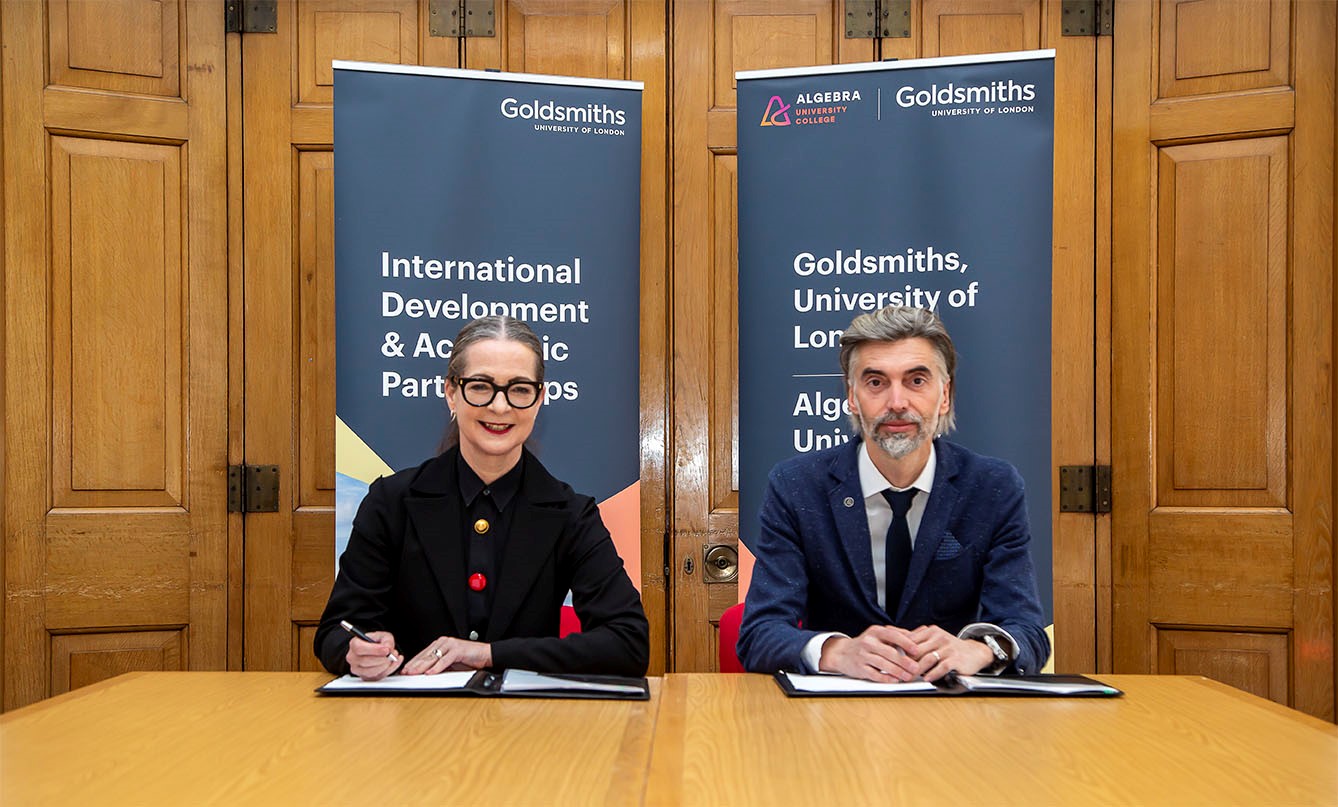
The Algebra and Goldsmiths Academic Partnership Agreement is the result of a two-year validation process of Algebra's study programmes, student support framework and quality assurance systems, conducted by British experts and heads of study programmes with their Croatian colleagues: study and department heads, teachers, assistants, vice deans, teaching support department, international application office, examination coordinators and other professional services of Algebra. After analysing the study programmes, their contents and learning outcomes and the quality assurance system, the validation committee established that all the preconditions for cooperation have been met.
Deputy Warden of Goldsmiths, Professor Elisabeth Hill said: “We will collaborate with colleagues at Algebra in ensuring these academic programmes meet the highest quality and standards, are dynamic and responsive to developments in the industry, and are informed by the latest research and advancements in teaching practice. We are confident that students will enjoy the highest quality learning experiences, undertaking cutting-edge academic programmes that will equip them with the skills to thrive in the fast-paced digital and creative sectors and make a real difference in their communities.”
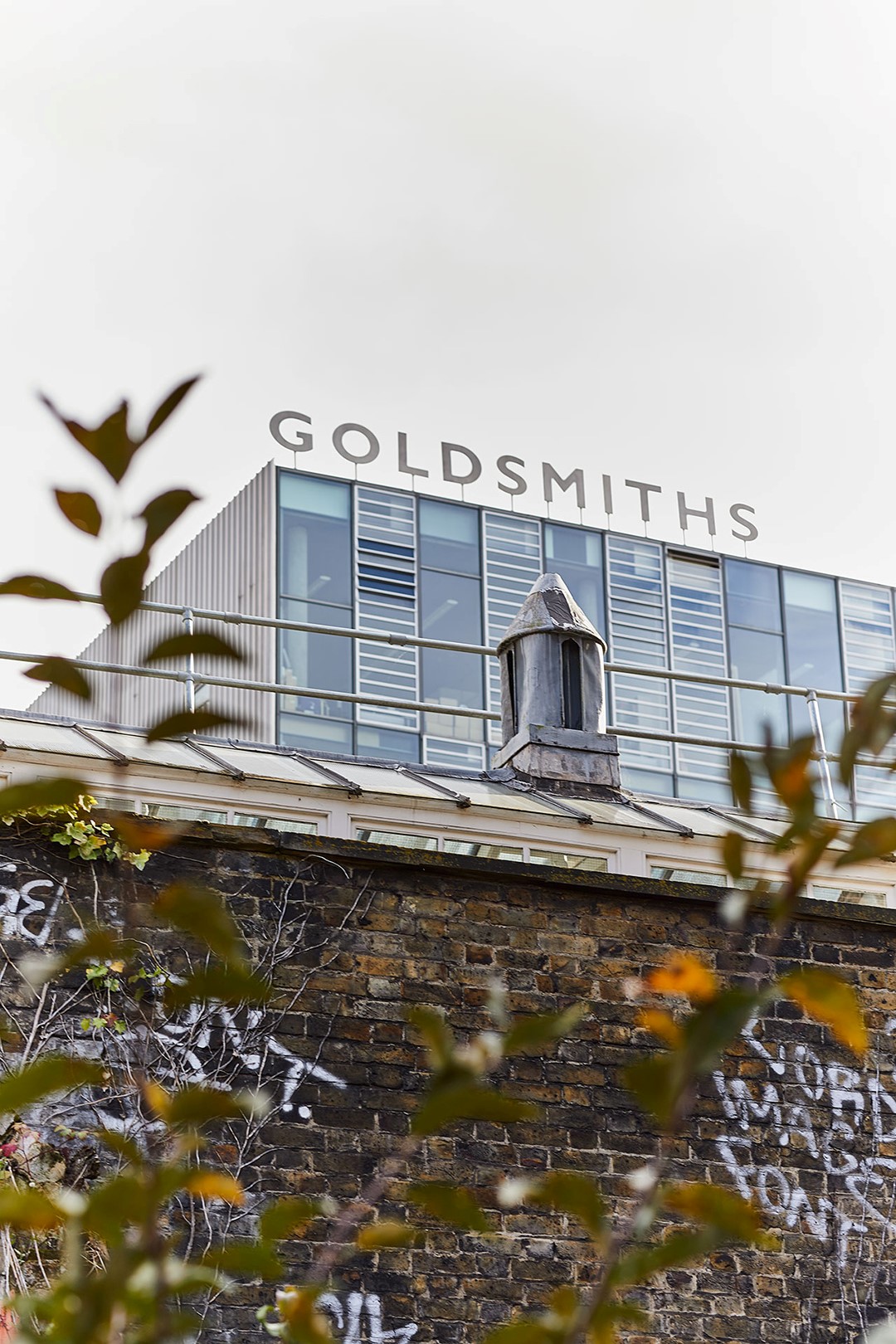
Starting from the academic year 2022/2023, Algebra students will be able to study Design, 3D Design, Multimedia Computing, Digital Marketing, Data Science, Software Engineering, Systems Engineering or Game Development according to programmes validated by one of the 500 best universities in the world. Algebra students who opt for this option will take courses in English. The conditions for enrolment are the same as the conditions for the enrolment of studies conducted in Croatian, with a mandatory test of English language skills.
“In two cycles of audits of the quality assurance system conducted by Croatian Agency for Science and Higher Education, Algebra University College received the highest possible grades and quality certificates. Our highly developed quality assurance system was a kind of ticket to open a dialogue with Goldsmiths and a pledge for this great success that we achieved by signing this Academic Partnership Agreement. During the process of validation of our study programmes, we were additionally convinced of the quality of our partners from London, which prompted us to start double-marking all exams in the current academic year and providing development-oriented feedback to students after each test. These and other approaches that we have adopted, and which are partly the reason why British higher education system is still at the very top of the world, have become our norm in the implementation of study programmes,” said Mislav Balković, Algebra University College Dean, during the signing ceremony of the partnership agreement in London.
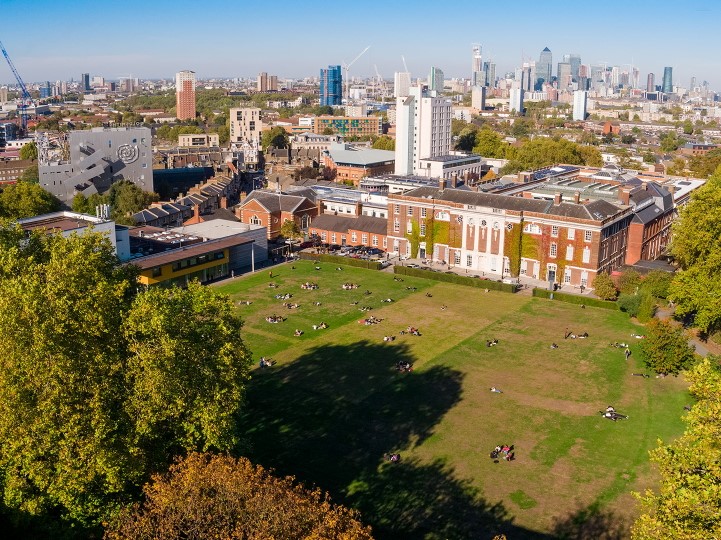
The goal of this collaboration is to increase the number of students studying in English and contribute to the Algebra Development Strategy, which targets 2,300 enrolled students by the end of 2026, of which at least 500 are foreigners. Although the price of such study is somewhat higher than the average price of studies in Croatia, from the perspective of parents and students, this means that with a much lower financial cost and without the cost of living in a relatively expensive environment, students earn two esteemed degrees, trusted by Croatian and British employers.
With this partnership, Algebra forms one of the most potent international hubs for students in Croatia which launched more than 1,000 candidates and students in the past five years. This partnership between the British and Croatian higher educational institutions also opens the door to Algebra graduates who will be interested in postgraduate specialization in the UK. The multinational and multicultural environment that today already exists on Algebra in Zagreb, and is consisted of students from India, Turkey, Brazil, China, USA, Ukraine, Russia, Spain, France, Iran, Kenya, Nigeria, Italy, Macedonia, Kosovo, Bosnia and Herzegovina, Pakistan, Bangladesh, and the UAE, will soon become even more attractive to a growing number of students coming from Asia, South America, Africa, the Middle East and rest of Europe to Croatia.
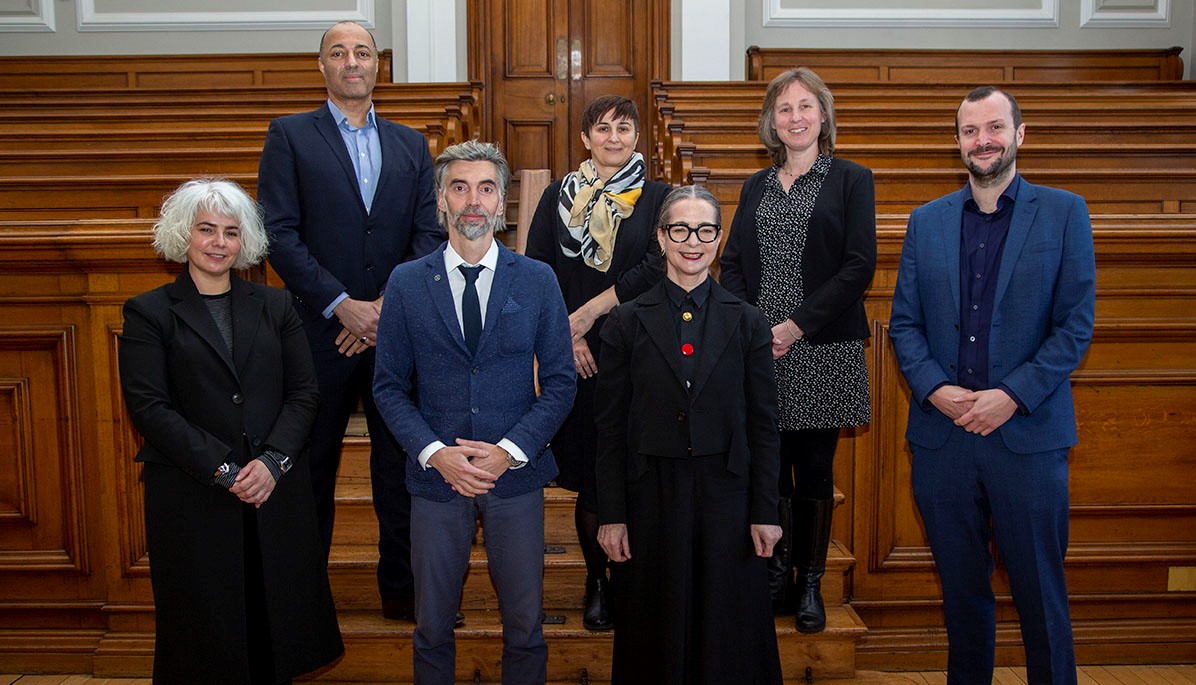
Professor Frances Corner OBE, Warden of Goldsmiths, University of London, said: “We are truly proud of our international partnerships at Goldsmiths, and I am delighted that Algebra University College is joining this global community. This partnership will provide more students around the world with access to a Goldsmiths degree. But more than that, it will bring opportunities to build on the strengths of our two institutions, develop our collaboration between Algebra and Goldsmiths into new and exciting areas, and ensure all students - wherever they study - have a high quality, rewarding and impactful learning experience. I look forward to a rewarding relationship in the years ahead.”
Information and applications for studies ending with a British and Croatian degree are available here. Starting now, high school graduates can choose Algebra undergraduate studies in English through the official portal of the Agency for Science and Higher Education.
For more, check out our dedicated lifestyle section.
Croatian Algebra Awards Scholarships Worth More Than 500,000 HRK
June the 1st, 2021 - The Croatian Algebra educational institution is offering scholarships for its MBA programme which exceed the very handsome amount of 500,000 kuna.
As Novac writes, the final presentation of the candidates who have applied, the team work on this assignment and then the announcement of the most successful scholarship holders ended the scholarship competition of the Croatian Algebra University this past weekend.
The above competition involved candidates who were given the opportunity to win full and partial scholarships for the only e-Leadership MBA programme in Croatia and the wider area. It involves teaching modules imbued with topics related to the digital transformation and the industrial revolution 4.0, the Croatian Algebra University said.
The partner of the final day of the competition was one of the most innovative global marketing companies, Red Bull, whose experts prepared a challenging business case to be solved by Algebra's scholarship candidates. The mentors available to the teams were Hrvoje Martic (Infodom), Luka Maricic (Superology), Filip Petrovic (JGL), Mario Pavic (Five), Juraj Zlof (GrowthFix), Petra Stojanov (Algebra LAB) and Zeljko Riha (Riha & Stamac).
As part of this year's competition, one full scholarship, one scholarship in the amount of half the tuition fee and ten partial scholarships were awarded. Although the applications for the scholarship competition were individual, on the scholarship day itself, the candidates competed in teams, so that, in addition to individuals, members of the three best placed teams also won partial scholarships for MBA studies at the Croatian Algebra University.
The candidates, who were divided into teams, voted for the performances of other teams and solutions to the aforementioned Red Bull business challenge that they liked the most. Members of the winning team, "Arima One", won scholarships for the MBA programme in the amount of 35,000 kuna per candidate, the second-placed team "Running Cord" was offered scholarships in the amount of 30,000 kuna, while the third-placed team, "Divas", was awarded scholarships in the amount of 25,000 kuna per candidate.
The jury will then award the most valuable prizes, a full scholarship for the MBA programme in the amount of 135,000 kuna, as well as all remaining partial scholarships this year, after further analysis of individual performances in the coming days due to the complexity of the evaluation process and the very good presentations of the candidates with their project solutions. The jury of this year's scholarship competition consists of members of the MBA team of the University of Algebra - Goran Radman, Maja Dujlovic, Arsen Solic and Natasa Soic.
"We believe that our vision of upgrading the classic MBA study with topics related to the digital transformation and the industrial revolution 4.0 is becoming more and more real every year, with each new generation of students.
The great interest we've seen from the candidates for this year's scholarship competition as well as the great successes achieved in the business sphere and in the careers of our previous candidates, as well as our current students and graduates, show that this MBA programme has successfully responded to the challenge of educating people for leadership and management skills, but also that it inspired them to creatively apply digital technologies with the goal of digitally transforming the business of their companies. We'd like to congratulate all of the scholarship holders on their scholarships and we believe that they'll also represent a step towards significant progress in their careers,'' emphasised Arsen Solic of the Croatian Algebra University.
The Algebra MBA scholarship competition is otherwise, and traditionally, a fantastic opportunity for business networking. The final competition, which sees the solving of a specific business challenge, attracts people in similar career positions in some of the best Croatian and international companies. As the Algebra MBA e-Leadership programme combines knowledge and skills from the fields of business management, managerial skills and knowledge of digital technologies, as well as the implementation of digital transformation, its participants are usually those who require some of these skills - and their synergy effect - for further advancement and to take new, leading positions in their companies.
For more, follow our dedicated lifestyle section.
Croatian EY Entrepreneurs of the Year Announced
November 17, 2020 - The Croatian edition of the prestigious EY Entrepreneur of the Year award has been completed. Hrvoje Josip Balen, Mislav Balković, and Tomislav Dominković from the Algebra company were named as the new Croatian EY Entrepreneurs of the year.
As Poduzetnik writes, one of the largest and fastest-growing educational groups in Croatia was chosen from six finalists in a competition of more than 55 candidates from 40 companies. As the winners of the national edition, Algebra will represent Croatia at the world finals in Monte Carlo.
Algebra is a company focused on undergraduate and graduate education, lifelong learning, and corporate education. Also, Algebra prepares high school students for graduation and offers a digital education for primary school students. They are also active in the field of educational consulting and digital publishing. During the 21 years of its existence, more than 120,000 people have completed various types of educational programs in Algebra, and 15,000 students of all ages enroll in various fields and studies each year.
Today, Algebra is the most important educational partner of companies such as Microsoft, Google, Oracle, Cisco, Adobe, Red Hat, Vmware, and many others, and it is also a prominent member of numerous eminent academic initiatives.
"Despite all the hardships that befell us this year, with great energy and desire, we managed to fight back and continue to develop our dream. We come from a sector that is not primarily perceived as entrepreneurial, from the education sector, but we were committed to building a successful system by which we will participate in creating new ideas, added value, and future professionals for the benefit of all of us. Thank you to fellow entrepreneurs for the recognition, which will certainly serve as an additional motivation for us in the days to come," said Hrvoje Josip Balen from Algebra during the proclamation.
The expert and the independent jury consists of entrepreneurs and investors Nenad Bakić and Saša Cvetojević, together with previous winners Alan Sumina, Đuro Horvat, Marko Pipunić, Mate Rimac, and Silvio Kutić, led by the President of the Management Board of Atlantic Grupa Emil Tedeschi. The winner was chosen according to global criteria which, in addition to financial indicators, focus on entrepreneurial spirit, innovation, personal integrity, and strategic direction.
"Although the circumstances of life and business have changed, what remains unchanged are the values underlying this award and program. These values are positively evidenced by the entrepreneurial news that resonates with the public in recent months, but also over the years. Almost all previous laureates and finalists of the past five years have achieved great results, and they are connected by hard work, knowledge, desire, courage, and the ability to gather outstanding teams. Besides, the desire for constant education and the acquisition of new knowledge is crucial for their success. It is the constant development of new ideas and knowledge that will be the foundation of further success in all areas," said Emil Tedeschi, President of the Jury, in his introductory speech. Speaking about the importance of the award, he added: "This is a unique award given by entrepreneurs to entrepreneurs, which celebrates entrepreneurship with the message that the best among us are all role models and inspiration."
Winners Hrvoje Balen and Mislav Balković from Algebra in the company of Berislav Horvat, Saša Cvetojević, Nenad Bakić, Mate Rimac, and Josip Pavlinić at the award ceremony of the prestigious EY Entrepreneur of the Year award / Poduzetnik.biz
Apart from Algebra, the selected group of this year's finalists, who presented their success stories in Zagreb's Lauba on Friday, November 13, consisted of Nikica Gabrić from the Svjetlost Clinic, Anita Cvetić Oreščanin, Dražen Oreščanin, and Lidija Karaga from the company Business Intelligence (Poslovna inteligencija), Gordan Lauc from Genos, Stjepan Šafran from Metal Product, and Matt Darko Sertić from Applied Ceramics.
During the opening ceremony for the most successful Croatian entrepreneur, Berislav Horvat, Country Managing Partner at EY Croatia, said:
"This year was specific, it put every individual, including everyone who has dedicated their lives to entrepreneurship and creating new values, numerous unexpected temptations. I am convinced that even in such times, it is entrepreneurs and their innovations, optimism, ability to quickly adapt and find the best solutions that can re-create new values and help the further development of society. Therefore, a big thank you to all entrepreneurs for the extra effort they put into building a better society just when it is most needed."
Minister of Finance Zdravko Marić pointed out that glorifying entrepreneurial success is extremely important in these unprecedented times and that entrepreneurs have once again shown how important their role is in the development of the economy and society as a whole.
Croatian entrepreneurship has once again shown that it has the strength and potential, and the sixth edition of this most prestigious world award in entrepreneurship presented the most successful and brought additional motivation for business development and perseverance.
To read more about business in Croatia, follow TCN's dedicated page.
Only a Few Days Left to Apply to the Most Innovative Summer School in Europe!
The last thing you’re likely to want to hear about in summer is school, we get it, but that’s exactly why this summer school is different. Meet Algebra, located in the Croatian capital city of Zagreb and easily accessible from any direction.
Algebra has been providing high quality education for more than 20 years in digital technology with bachelor and master programs in computer engineering, digital marketing and design, as well as e-Leadership MBA. Accompanied with 150 faculty members and more than 500 experts ready to help whenever necessary, 1,100 students in higher education and 15,000 students attending the numerous programs the school offers annually, from courses to MBA programs, Algebra isn’t just your run of the mill summer school. Far from it.
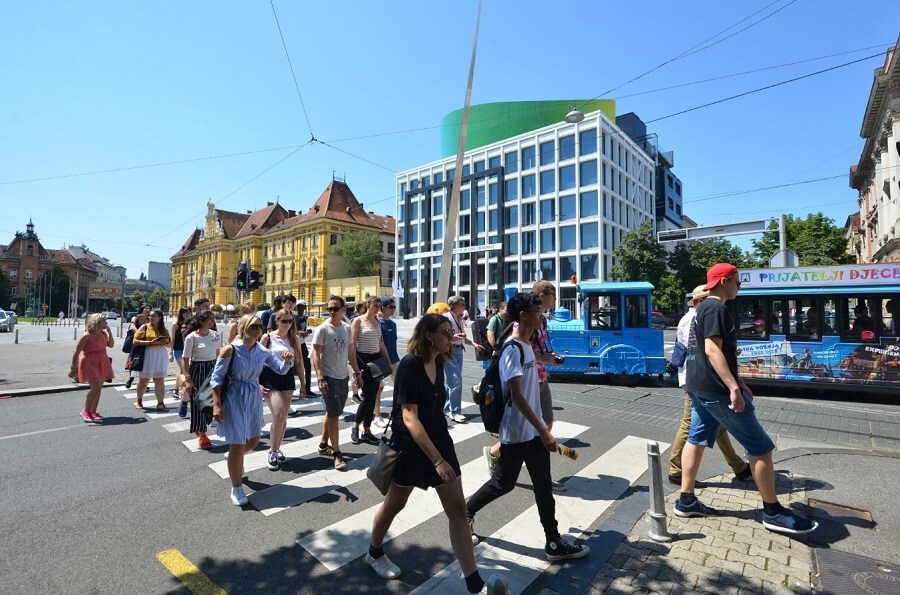
Not everything is about school, and I believe it was the wonderful Oscar Wilde who once hinted at the good old ‘’school of life’’ being the most important ‘’faculty’’ one can attend. Algebra is very much a school to prepare its students for real life, and works to properly equip its students for the world of work, and this isn’t just some tired old mantra, but a reality. The proof is there to be seen, and as many as 96% of Algebra’s students find employment within just six months of graduation.
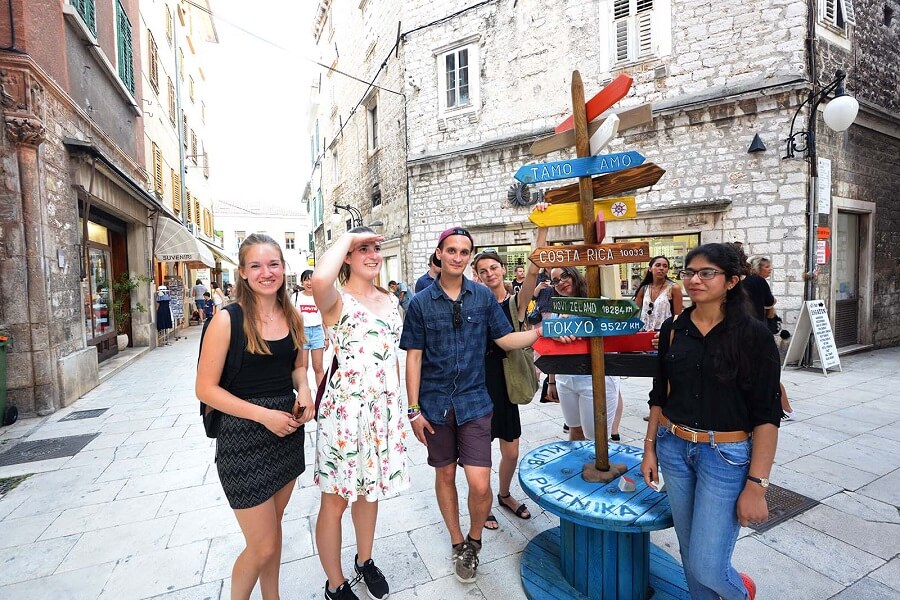
With bachelor and master programs not only in STEM, but in Arts as well, Algebra sets its students up for life in the world of work, and therefore sets itself apart as a summer school, caring less about being self-serving and more about creating the workforce of the future, and providing them with all of the necessary skills and knowledge to conquer everything from multimedia and programming to cyber security in an increasingly technological age dominated by artificial intelligence and Internet of Things.
With highly respected academic partners such as Microsoft, Oracle and IBM (just to name a few), it’s little to say that Algebra is a deeply trusted school.
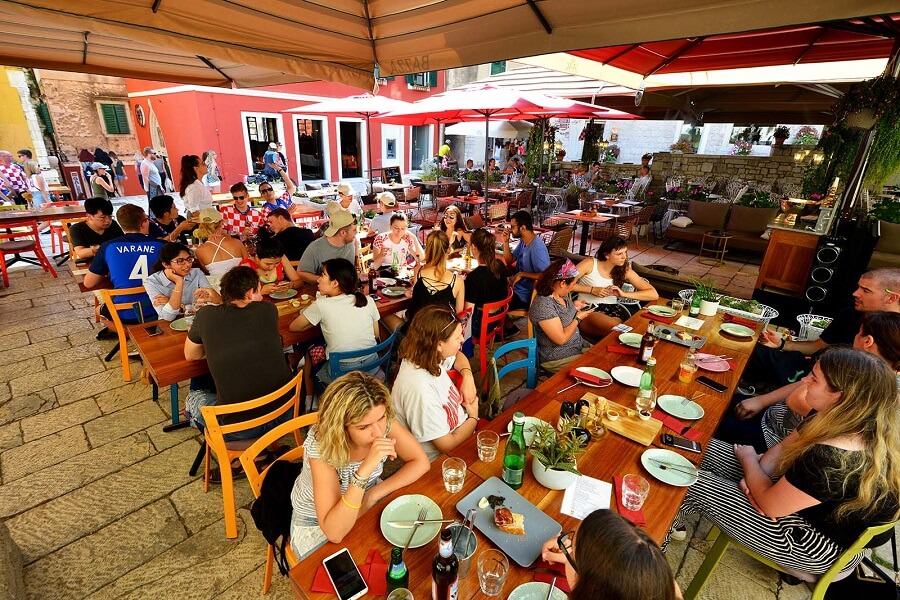
From artificial intelligence and cyber security to digital marketing and data driven storytelling, digital sculpting fundamentals and creating 3D projects, to the internet of things and mobile application development, this school is successful in keeping up with the modern world of education, and paving the way for the future employees of the modern world of work.
Lasting three weeks during the summer, Algebra prides itself on placing an emphasis on the exceptionally high quality of its study program, its lectures, professors and of course, its enviable curriculum. For the latter, it’s perhaps best to see what the students themselves say:
“I was overwhelmed by the quality of the course I completed and the university staff were beyond supportive and accommodating.”
“Every lesson was taught by an expert in that field, so I enjoyed the focus on practical and experimental aspect and not only on theory’’
“Algebra summer school exceeded all my expectations. Great staff, excellent lecturers and a warm atmosphere.”
“This program perfectly offers courses of very high quality taught by professors who not only are great at what they do but that are also excellent in communicating their knowledge. The fact that the classes are small also adds on the benefit of one-to-one interaction, with professors that have the time to go over doubts and help students personally without wasting too much time.”
„Everything I expected and more, the courses are very hand on, challenging and intensive, but rewarding“
„I expected practical knowledge, my idea was to learn how to contribute and do something with my own hands. The quality of teaching was spectacular. Classes are small so the professor could help us in any moment. We got to visit 2 cities, and emerge ourselves to Croatian culture.“
„I expected to learn as much as I could and have fun, but I also found a great lecturer, the teaching level was really high. You can learn a little bit every day.“
„This summer school is all about combining future professions, summer and friends. Very intensive courses, really good professors with great knowledge and intention to explain and overcome the problems and situations.“
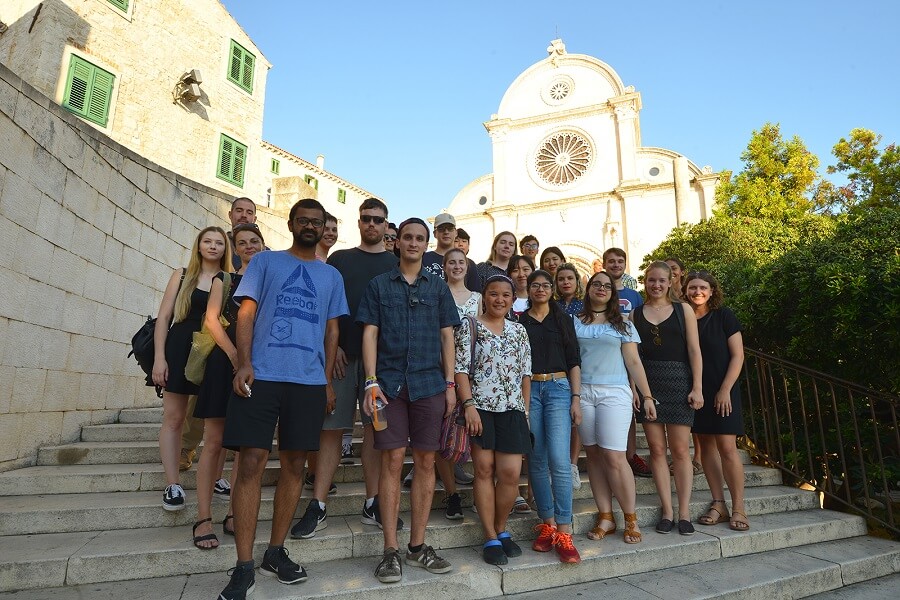
The old saying goes that the child in us dies when we stop wanting to learn new things. One can never know everything, as everything is always changing. This international summer school provides an excellent opportunity to learn something new in a way that truly inspires you. The university offers eight different courses which are both creative and very applicable, allowing for a summer spent gaining new skill sets and knowledge. Fancy trying your hand? Here’s what Algebra offers:
Digital marketing – New ways of communication
Data driven storytelling – Create stories using big data and advanced visualization
Digital sculpting fundamentals – Learn the basics of sculpting in Zbrush
Creating a Detailed Project in 3D – From the very basisc to the postproduction of the final image
Mobile application development – From idea to creation
Cyber security – The forc3 is strong with this one
Internet of Things – Create a weather measuring system with cloud visualization
Artificial Intelligence – Today and in the future
There’s nothing quite like meeting a person who happens to be interested in the same things you are, and is all in all likeminded. Algebra is the perfect place for that, and you’ll connect and make lifelong friendships with those who are also helping to shape the digital future. Here’s what was done last summer as part of a truly international experience.

Travelling is something that almost everyone can agree is amazing. Sometimes you need to step out of your comfort zone in a new place to really discover who you are, and this is the perfect opportunity, not to mention the perfect country. Croatia boasts more than 1,000 beautiful islands and enjoys a massive 2700 hours of sunshine annually!
With Algebra, you’ll get to spend two weeks in the Croatian capital, which has close links to the Vienna, Venice, Budapest, Belgrade, Sarajevo and many more owing to its excellent geographical position. You’ll head down to the beautiful Dalmatian coast to the historic town of Sibenik during the height of the summer season. Sibenik is close to Krka National Park, Prvic island, and Smiljan, which is the birthplace of the genius Nikola Tesla.
Join Algebra from the 7th to the 27th of July, 2019, for an unforgettable learning experience in a summer school with a difference, the best in all of Europe.
Sounds good? If so, it’s time to get packing and looking forward to an incredible summer in Croatia. You’ve got until May the 20th to apply to the Algebra International Summer School, so the time is now to start planning the summer of a lifetime.


